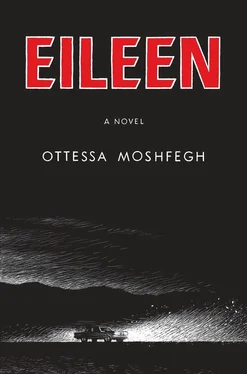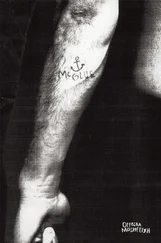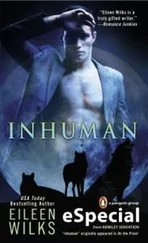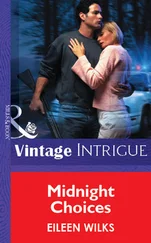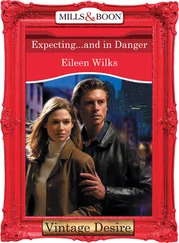“Can you bring a ladder?” I asked James when he returned to his post.
I remember the smell of his pomade — a sad, lanolin smell — from when he placed the ladder gingerly beside the tree and held it for me while I climbed it, drops of sweat sitting like dew on his balding forehead.
“Don’t look,” I said, although I knew he would never dare glance up my skirt. He nodded. I so rarely got to act important, I relished that exchange.
When I had finished with the ornaments and put the empty cardboard box back in the storage closet, Mrs. Stephens looked up from her paperwork. The tree looked beautiful — I was proud of it — but she hardly noticed. She had powdered sugar on her nose and a smear of raspberry jelly on her sweater, no sense of decorum, seemed to care nothing what people thought of her. She’d been the office manager at Moorehead for decades.
“Eileen,” she said. Her voice was a vicious monotone. “You’ll work the lights Monday at the pageant. I can’t do the lights anymore. I don’t want to.”
“Fine,” I said.
One day I’d be gone, I hoped, never to have to look at her or think of her again, so I tried to hate her with all my might, squeeze our encounters for every last drop of disgust she could ever inspire in me. I knew better than to mouth off or cause any fuss, but I tried to send her violent messages with my mind. She’d hired me as a favor to my father. To my great embarrassment, on occasion I had mistakenly called her “Mom.” Mrs. Stephens rolled her eyes then and chimed sarcastically — gums glistening, bubbles of saliva popping in a broad grin, that damn caramel candy clanking against her back teeth—“Of course, dear, whatever makes you happy.”
I’d laughed and cleared my throat and corrected myself. “Missus Stephens.”
I doubt she deserved the amount of hatred I directed at her, but I loathed just about everybody back then. I recall driving home that night, imagining what her body looked like under all that paisley print and gray wool. I pictured the flesh hanging from her bones like cold flanks of pork swinging from hooks at a butcher shop — thick, clammy, orange-hued fat, meat tough and bloodless and cold when the knife hacked through it.
I can still see the twenty-minute drive from Moorehead to X-ville. The long expanse of snow-filled pastures, the dark forest and narrow dirt roads, and then houses, first sparse, homesteads, then smaller and closer together, some with white picket fences or black iron posts, then the town with the ocean glinting on the horizon from atop the hill, then home. There was, of course, a sense of comfort in X-ville. Imagine an old man walking a golden retriever, a woman lifting a bag of groceries from her car. There was really nothing so very wrong with the place. If you were passing through, you’d think that everything was fine there. Everything was wonderful. Even my car with the broken exhaust and the biting cold at my ears was fine and wonderful. I hated it, and I loved it. Our house sat one block from an intersection where a crossing guard directed traffic in the mornings and afternoons for the children who went to the elementary school up the block. Oftentimes stray mittens or scarves were placed on the spokes of the neighbors’ fences, or in winter spread out on the high banks of snow like a lost-and-found. That night there was a boy’s knit wool hat on the snow by our driveway. I inspected it under the lamplight and tried it on. It was tight enough to make a seal around my ears. I tried saying something, “Randy,” and my voice vibrated, an echo inside of me. It was weirdly peaceful there inside my head. A car passed silently through the slush.
As I walked up the narrow path to the front porch, a car door opened across the street and a uniformed cop crossed the murky ice toward me. The wind was strangely still, a storm brewing. A light went on inside the house, and so the cop stopped in the middle of the road.
“Miss Dunlop,” he said, and motioned for me to come near. This was not out of the ordinary. I knew most cops in X-ville. My father did his best to prompt their visits. That night Officer Laffey told me the school had called to complain that my father was lobbing snowballs at children from our front porch. He handed me a letter of warning, bowed his head, and walked back to his car.
“You can come inside,” I said, voice booming between my ears. “Talk to him?” I held the letter out.
“It’s late,” he said, and got back in his car and on his radio.
Those icicles hanging above the front door must have grown by several inches while I’d been gone, since I remember reaching up and touching the tip of one and being disappointed by its bluntness. I could have swung my purse up and broken them all off if I’d wanted to. But I just shut the door gently and kicked off my shoes.
Here’s the house. The front hall was wallpapered in dark green and blue stripes and had golden wood moldings. The stairs were bare because I’d broken the vacuum cleaner that summer, then ripped out all the rugs. It was too dark in the house to see the layer of dust over everything. The lights in the front hall and the living room had burned out. Every once in a while I collected my father’s cans and bottles, his disordered newspapers which he read, or pretended to read, at the top of the stairs, letting page after page sail over the banister and drift down into the front hall. That night I snatched up a few pages — we got the Post —crushed them into tight balls, and threw them at his back while he stood at the sink.
“Hi, Dad,” I said.
“Smart ass,” he said and turned and kicked the crumpled newspaper across the floor. In all my twenty-four years of knowing him, I don’t think he ever said “Hello” or asked how I was. But some nights when I looked particularly tired he might have asked me, “How are your boyfriends? How are all your boys?” I really only ever sat down at the kitchen table long enough to eat some peanuts and listen to him complain. We ate a lot of peanuts, Dad and I. I warmed my hands on the stove. I remember I wore these thin black gloves with green flowers stitched along the fingers. In my ridiculous self-denial I did not buy proper winter gloves for myself. But I liked those black ones with the flowers. Women still wore gloves then. I didn’t mind the custom. My hands were thin-skinned, sensitive, and always ice-cold anyway, and I didn’t like touching things.
“Anyone new they drag in?” Dad asked that night. “Polk’s boy faring all right?” Polk had been in the news recently, an X-ville cop killed by his own son. My father had known him. They’d been on the force together.
“Paying for his sins,” I replied.
“Good riddance,” said my father, wiping his hands on his robe.
The mail sat in a pile on the counter by the stove. The National Geographic was rather lackluster that month. Several years ago I found that same issue in a used book store — December 1964—and have it here somewhere between all my books and papers. I doubt a thing like that is valuable fifty years later, but to me that magazine feels sacred, a snapshot of the world before everything in it changed for me. It was nothing special. The cover shows two ugly white birds, doves maybe, sitting on a cast-iron fence. A holy cross looms out of focus above them. The issue includes profiles of Washington, D.C., and some exotic vacation destinations in Mexico and the Middle East. That night, when it was new and still smelled of glue and ink, I opened it briefly to a picture of a palm tree against a pink sunset, then slapped it down on the kitchen table, disappointed. I preferred to read about places like India, Belarus, the slums of Brazil, the starving children in Africa.
I handed my father the letter of warning from Officer Laffey and sat down for a few peanuts. He waved the letter in front of his eyes and tossed it in the trash. “Just for show,” he said. The delusions he suffered from were the most effective kind — everyone played a role in his conspiracy theories. Nothing was as it appeared. He was haunted by visions, dark figures— “hoodlums,” he called them — that moved so fast, he said, he could only see their shadows. They’d duck under porches and hide in dark spots and in bushes and up in trees, and they watched him and taunted him, he said. He’d thrown some snowballs out the window that day just to let on that he knew what they were up to, he explained. The police had to admonish him to make it look like there was nothing fishy going on — just an old man losing his mind.
Читать дальше
